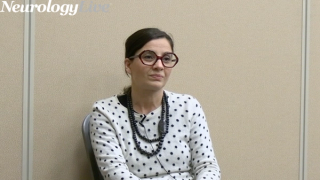
Parkinson Disease
Latest News

Latest Videos

CME Content
More News

In this conversation, Kremens discussed the common use of antiemetics in Parkinson disease, the real-world data surrounding these agents, and whether there are certain clinical advantages to apomorphine hydrochloride injection.

A recent study showed the relationship between genes associated with lysosomal function and environmental exposure to pesticides in Parkinson disease.

Daniel Kremens, MD, JD, provided commentary on a number of various amantadine formulations for Parkinson disease, and how timing of dosing impacts efficacy.

Kenneth Ngo, MD, medical director for the Brain Injury Program at Brooks Rehabilitation’s 3 inpatient hospitals, highlighted how cotreatment between music therapy and physical therapy can significantly improve the overall quality of life for patients with Parkinson disease.

Using the Wechsler Adult Intelligence Scale Fourth Edition (WAIS-IV) Coding Test score, SAGE-718 failed to distinguish itself from placebo.

Drs Isaacson, Pahwa, and Gupta discuss the management of dyskinesia and providing good ON time in Parkinson’s disease, sharing practical tips for early identification and treatment of dyskinesia, as well as their experience with current treatments.

Larry Gifford, a patient living with Parkinson Disease and president of the PD Avengers, discussed sleep issues and nighttime symptoms faced by millions of patients with the disease worldwide.

Tavapadon's phase 3 success complements ongoing monotherapy trials, addressing the need for effective and well-tolerated PD therapies.

Patients experienced improvements in ON/OFF time and motor function, with favorable tolerability, paving the way for a phase 2 trial.

Neal K. Shah, CEO of CareYaya Health Technologies, an AI innovator in neurological care, discussed how technology is poised to transform the fight against Parkinson, with the potential to improve millions of lives and advance health equity.

Even at the highest modal dose range, findings from the phase 3 RISE-PD trial showed that IPX203 did not increase safety risks for patients with Parkinson disease over time.

The professor of neurology at University of Rochester discussed a new model on how Parkinson disease may originate, highlighting potential environmental causes and progression. [WATCH TIME: 5 minutes]

Sleeping Around the Podcast × NeurologyLive brings you a clinical overview of a newly published study highlighting extracellular vesicle-associated miRNA features that could be diagnostically informative of RBD in patients with Parkinson disease.

SPN-830, an apomorphine infusion device, had its new drug application submitted using data from the phase 3 TOLEDO trial.

Drs Isaacson, Pahwa, and Gupta discuss the management of dyskinesia and providing good ON time in Parkinson’s disease, sharing practical tips for early identification and treatment of dyskinesia, as well as their experience with current treatments.

Findings from a recent study revealed the significant influence of lysosomal polygenic burden on cognitive decline in patients Parkinson disease who also have a low risk of Alzheimer disease.

Although results from the phase 2 LixiPark trial showed that lixisenatide may slow motor symptom progression in early Parkinson disease, reported gastrointestinal adverse effects raise some safety considerations.

Zoltan Mari, MD, shares advice and tips to physicians and patients for the use of wearable devices in PD.

An expert neurologist highlights resources for patients and physicians to gain access to wearable devices to aide with management of PD.

Sleeping Around the Podcast × NeurologyLive brings you a scientific overview of the crossover between Parkinson disease and sleep disorders.

The randomized, double-blind, placebo-controlled trial failed to show any beneficial symptomatic effect of 4-month treatment with 1.75–3.5 mg/day bumetanide on Parkinson disease.

The findings were consistent with the chemical's known carcinogenicity and supportive of the emerging preclinical and epidemiological evidence that ties TCE exposure to patients with PD.

A recent study revealed that digital composite measures for bradykinesia outperformed traditional assessment methods for Parkinson disease over a 12-month period.

Zoltan Mari, MD, provides an overview of the use of smartphone applications to help patients manage PD, highlighting a keyboard typing assistance app.

An expert neurologist discusses sensory-based wearable devices used to control PD symptoms, commenting on challenges with these devices.















